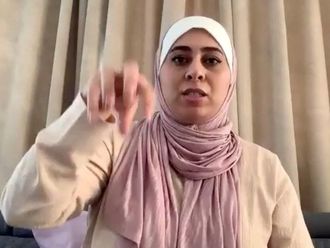Washington: US Vice-President Joe Biden publicly accusing US allies of supporting extremists in Syria is not far from what Obama administration officials are saying in private.
Biden apologised over the weekend to Turkey and the UAE after saying they had a role in allowing foreign fighters, weapons and money into Syria to bolster groups fighting Syrian President Bashar Al Assad. He also made similar statements about Saudi Arabia’s role in aiding extremists.
The diplomatic scramble that followed underscores the Middle East’s tangled alliances and the murky sources of support that have helped Syria become a hotbed for extremists. While Biden’s comments were in line with some of what US officials have been saying for months, they also have the potential to complicate administration efforts to keep those same counties in the coalition fighting Daesh, one of the most violent groups that have taken hold in Syria.
Even after Biden’s back-to-back apologies, the White House was still in clean-up mode on Monday. Officials made clear that Biden had erred in his public comments, but stopped short of declaring them inaccurate.
“He himself wishes he had said them a little differently,” White House spokesman Josh Earnest said in response to one of several questions on the matter in his daily briefing for reporters.
Biden, during a question-and-answer session at the Harvard Kennedy School on Thursday, said that one of the biggest challenges for the US in identifying a moderate opposition to Al Assad was that US allies were helping strengthen groups with extremist tendencies.
“The Saudis, the Emiratis, etc. What were they doing? They were so determined to take down [Al] Assad and essentially have a proxy Sunni-Shiite war,” Biden said. “What did they do? They poured hundreds of millions of dollars and thousands of tons of weapons in to anyone who would fight against Al Assad.”
The problem, the vice-president continued, is that the money and weapons ended up in the hands of the Al Qaida affiliate Jabhat Al Nusra and now Daesh.
Biden also singled out Turkey for allowing foreign fighters to flow across its border into Syria. In describing a phone call he had with Turkish President Recep Tayyip Erdogan last week, Biden said the Turkish leader had told him, “You were right. We let too many people through. So we’re trying to seal the border.”
The facts about the flow of weapons, money and fighters into Syria are murky, though US officials and regional experts largely agree that there are points of origin in Middle Eastern countries.
“There is no doubt that Turkey for a long time let fighters get into Syria,” said Marina Ottaway, a senior scholar at the Wilson Centre, a Washington-based think tank. “They were determined to get rid of Al Assad so they were allowing people to go through.”
Ottaway said there was also “certainly money going from Saudi Arabia, there was money going from Qatar.”
While President Barack Obama and other senior administration officials have talked broadly about the need to limit regional support for extremist groups in Syria, they’ve stopped short of calling out specific countries and governments by name.
A key question about the source of the support for extremist groups is whether the regional governments explicitly facilitated the flow of money, weapons and fighters, or just turned a blind eye to the actions of wealthy and well-connected individuals within their country. Biden appeared to suggest a more direct government role than other US officials have.
Surprising success
The timing of Biden’s remarks created a diplomatic headache for a White House that has spent months trying to convince powerful regional players to join the fight against Daesh group.
Thus far, Obama has had surprising success in garnering their support. Five Arab nations have joined the US in the bombing campaign against the militants in Syria, including Saudi Arabia and the UAE. Turkey’s parliament also approved a motion giving the government powers for military operations across the border in Syria and Iraq and for foreign troops to use Turkey’s territory.
The swiftness of Biden’s personal apologies to Turkey’s president and General Shaikh Mohammad Bin Zayed Al Nahyan, Crown Prince of Abu Dhabi and Deputy Supreme Commander of the UAE Armed Forces, reflect the degree to which the White House wants to keep those partnerships in place.
Still, the White House readouts of both apologies were carefully crafted. Officials said Biden apologised to Erdogan for implying that his country had “intentionally supplied or facilitated” the growth of Daesh or other extremist groups in Syria. The White House said Biden similarly told Shaikh Mohammad that he had “not meant to imply that the Emirates had facilitated or supported” extremists.
— With inputs from AP











